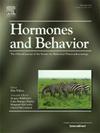Association between CAIDE risk score and episodic memory in middle-aged females: The impact of spontaneous menopause
IF 2.5
3区 医学
Q2 BEHAVIORAL SCIENCES
引用次数: 0
Abstract
There is growing evidence that postmenopause is associated with episodic memory decline in some females. Although midlife vascular risk factors are established predictors of brain health, it is unclear whether episodic memory decline at postmenopause is related to vascular risk, and whether such effects affect specific mnemonic functions (e.g. recollective processing vs. novelty detection). This study investigated whether vascular risk, measured by the Cardiovascular Risk Factors, Aging, and Dementia (CAIDE) score, predicts episodic memory in middle-aged females at pre- and post-menopause. Eighty-five cognitively unimpaired females (42 premenopausal, 43 postmenopausal) aged 39.5 to 65.1 years completed easy (low encoding load) and hard (high encoding load) versions of a face-location episodic memory task. Outcome measures were spatial source retrieval (correct source accuracy; CS) and detection of novel stimuli (correct rejections; CR). Linear-mixed models (LMMs) tested menopause group effects on CS and CR, while separate LMMs stratified by menopause status assessed whether CAIDE score predicted memory performance in each group. Results indicated that postmenopausal females performed worse than premenopausal females in both CS (β = 0.08, p < 0.001) and CR (β = 0.05, p = 0.011), with postmenopausal females more sensitive to task difficulty in CS. Higher CAIDE scores were associated with poorer CS accuracy in postmenopausal females only (β = −0.14, p = 0.009), with no effect on CR. These findings highlight the significance of vascular risk in episodic memory decline and emphasize the role of reproductive status in midlife cognition.
中年女性CAIDE风险评分与情景记忆的关系:自发性绝经的影响
越来越多的证据表明,绝经后与一些女性的情景记忆衰退有关。尽管中年血管危险因素已被确定为大脑健康的预测因素,但尚不清楚绝经后情景记忆衰退是否与血管危险有关,以及这种影响是否会影响特定的记忆功能(例如回忆处理与新奇检测)。这项研究调查了心血管危险因素、衰老和痴呆(CAIDE)评分测量的血管风险是否能预测绝经前后中年女性的情景记忆。85名年龄在39.5至65.1岁的认知功能正常的女性(42名绝经前,43名绝经后)完成了简单(低编码负荷)和困难(高编码负荷)版本的面部定位情景记忆任务。结果测量为空间源检索(正确源准确性;CS)和新刺激的检测(正确拒绝;CR)。线性混合模型(lmm)测试绝经组对CS和CR的影响,而按绝经状态分层的单独lmm评估CAIDE评分是否预测各组的记忆表现。结果显示,绝经后女性在两项CS中的表现均低于绝经前女性(β = 0.08, p <;0.001)和CR (β = 0.05, p = 0.011),绝经后女性对CS任务难度更敏感。仅在绝经后女性中,较高的CAIDE评分与较差的CS准确性相关(β = - 0.14, p = 0.009),而对CR没有影响。这些发现强调了血管风险在情景记忆衰退中的重要性,并强调了生殖状况在中年认知中的作用。
本文章由计算机程序翻译,如有差异,请以英文原文为准。
求助全文
约1分钟内获得全文
求助全文
来源期刊

Hormones and Behavior
医学-行为科学
CiteScore
6.70
自引率
8.60%
发文量
139
审稿时长
91 days
期刊介绍:
Hormones and Behavior publishes original research articles, reviews and special issues concerning hormone-brain-behavior relationships, broadly defined. The journal''s scope ranges from laboratory and field studies concerning neuroendocrine as well as endocrine mechanisms controlling the development or adult expression of behavior to studies concerning the environmental control and evolutionary significance of hormone-behavior relationships. The journal welcomes studies conducted on species ranging from invertebrates to mammals, including humans.
 求助内容:
求助内容: 应助结果提醒方式:
应助结果提醒方式:


